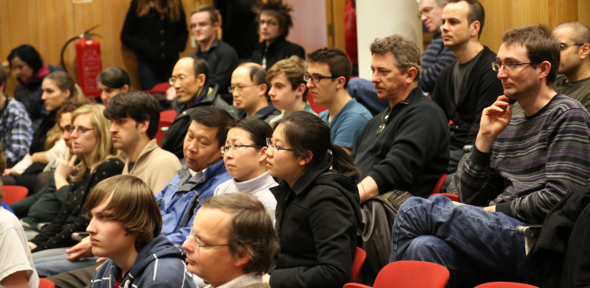
PhD in Computation, Cognition and Language (MLAL211)
Overview
The PhD in Computation, Cognition and Language is a PhD track for students who conduct basic and applied research in the computational study of language, communication, and cognition, in humans and machines. This research is interdisciplinary in nature and draws on methodology and insights from a range of disciplines that are now critical for the further development of language sciences, including (but not limited to) Linguistics, Cognitive Science, Computer Science, Engineering, Psychology and Neuroscience. A variety of PhD topics that fall within this remit are accepted.
Our current primary areas of research are:
- natural language processing
- computational and corpus linguistics
- computational models of human language acquisition and processing
- information extraction, mining, and presentation
- multilingual technology
- educational and assistive technology
- text data technology for health
- computational digital humanities
- computational approaches to the analysis of speech
- digital forensic speech analysis
In British universities, the PhD is traditionally awarded solely on the basis of a thesis, a substantial piece of writing which reports original research into a closely defined area of enquiry. The completion of the PhD thesis is generally expected to take three years, and most funding is based on this assumption. While the PhD is not a taught course, students will benefit from the availability of courses and seminars offered both within the MMLL Faculty and by other departments concerned with language science in Cambridge (e.g. Computer Science and Technology, Education, Engineering, Psychology, MRC Cognition and Brain Sciences Unit). All research students also benefit from a programme of professional training run at various levels within the School of Arts and Humanities, and enabling cross-disciplinary interactions. The programme includes seminars and workshops on e.g., giving conference papers, publishing, applications and interviews, teaching skills, specialist linguistic training. If you wish, you are likely to be given the opportunity of gaining experience in small group teaching for colleges. There may also be opportunities to gain some experience in teaching in the Faculty.
Academic Requirements
Applicants for this course must have a UK First-class Honours Degree or equivalent in linguistics, computational linguistics, artificial intelligence, computer science, or a related discipline. However, a first-class (distinction level) Masters-level degree is required. The degrees must testify to the applicant's substantial background in linguistics. Applicants are expected to demonstrate clear evidence of research potential. Well-developed programming skills are presumed.
Supervision
The Degree Committee for the Faculty appoints a primary supervisor and an advisor for each research student. In some cases, a second, co-supervisor, may be appointed, especially when the research topic is strongly cross-disciplinary. Research students in CCL will have daily contact with the research group within which they are placed. In addition, they should expect a meeting with their supervisor(s) at least once a month. The University of Cambridge publishes an annual Code of Practice which sets out the University’s expectations regarding supervision.
Prospective applicants can get an idea of the range of topics which can be supervised from the following lists of people:
- Staff and their Research Interests
- Full Section Staff List
- Members of the Faculty
- Current PhD Students
Seminars
Research students are expected to attend weekly research seminars and discussion groups in their research group. They may also attend other relevant research seminars offered by Linguistics or other language science departments in Cambridge. Research students must attend training in research skills. These are offered by Sectional PhD training seminars and the Researcher Development Programme of the University.
The thesis
There is a normal word limit for the thesis of 80,000 words (including footnotes and appendices but excluding bibliography). The thesis should represent a significant contribution to learning through the discovery of new knowledge or through the connection of previously unrelated facts, or the development of new theory, revision of older views or some combination of these. In writing the thesis you are expected to take account of previously published work on the subject and the thesis should be clearly and accurately written, paying due attention to English style and grammar. Candidates for the PhD in Cambridge are guided by a supervisor, though they will normally also discuss their work with a number of other experts in their field. Following submission of the thesis, an oral (viva) examination is held.
Assessment
Annual progress interviews constitute a system for the formal monitoring by the Degree Committee of the progress of all students working towards a PhD. Termly progress interviews take place in the fourth year of the PhD.
Postgraduate students are admitted in the first instance for a probationary period during which they are not registered as a candidate for the PhD degree. The first-year interview is the context in which registration as a candidate for the PhD is formally considered. Satisfactory progress is a condition for being registered as a doctoral student and for remaining on the register.


